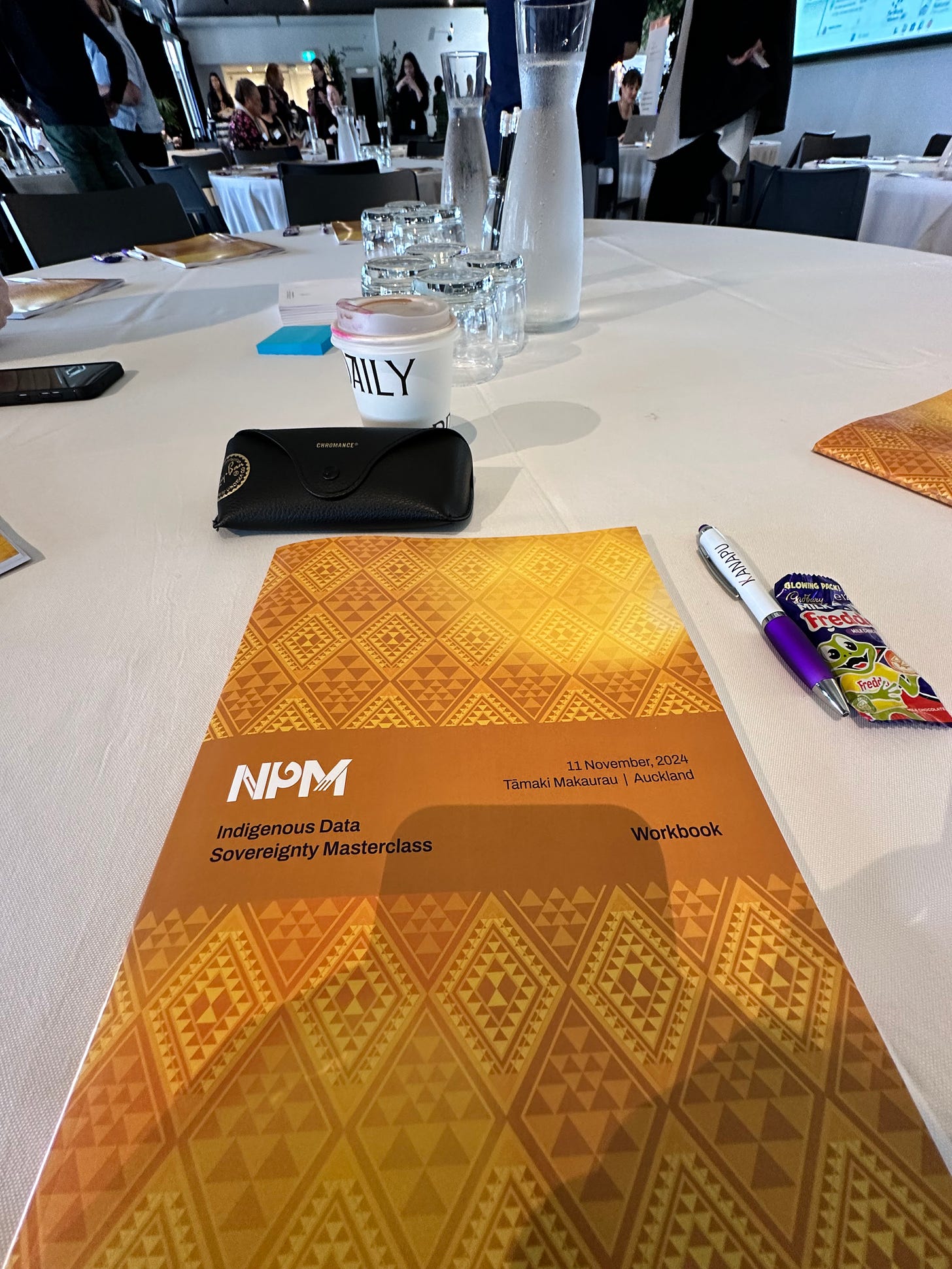A Hard Week - Politics, USA, NZ and The Certainty Trap
The past seven days seem like the hardest seven days I have experienced politically, both, globally and in New Zealand. So below, whats on my mind in an unpolished and reflexive way.
I’m in Auckland attending the International Indigenous Research Conference, specifically at the Indigenous Data Sovereignty Masterclass. It’s an honor and a privilege to be here not only as a PhD student and Tangata Titirti in New Zealand, but also during the week the hīkoi for the Treaty Principles Bill starts in the small Far North town of Te Kāo, and it not even being one week since Trump won in USA.
I wont lie, my heart hurts and my mind is muddled, between last weeks USA election, my own political journey, my upcoming PhD research proposal deadline in three weeks ( a deadline I’ve been working towards for the past 10 months) and the Treaty Principles Bill, Im properly emotionally, mentally and politically overwhelmed.
There is so much for my head and heart to get around, that even pretending this weeks Less Certain will be anything useful or insightful would be a disservice to you as the reader and me as the writer.
So I thought I would share some of my immediate reflections (again), as best I can, in some sort of cohesive way. I am sure that with time and the benefit of hindsight of the past seven days, my ideas and writing will become more settled.
So I keep thinking about political ideology
Political ideology is like our personal GPS for understanding and navigating not just politics, but society and our life. It dictates how we decide to make money, spend money, vote, what we read, what we don’t read, who we hang out with and who we don’t, so much! At a more macro level, it’s a set of beliefs and values that guide how we think society should be organized, how power should be shared, and what the government’s role should be in our lives.
Political ideologies are also like tectonic plates—when they collide with unyielding force, the ground beneath us begins to shake, as it did in USA last week. Political ideologies have became so divided, inflexible, and competing that we are now embarking in a new global reality.
Why Trump won is a hot topic and there is too much analysis to keep up with. I feel overwhelmed by it all, so I’m not here to talk about that or add to the noise. However, one great article that was shared with me recently was by Grace Blakeley, in case you keen. As always, I don’t agree with everything she says, but she definitely provides a clarity and perspective that seems easier to absorb.
So, back to political ideology
What if instead of trying to prevent the tectonic plates, or punish the tectonic plate that doesn’t agree with yours, we accept the deeply polarized world we live in and re-learn to think, talk and do politics? The rules of the game have fundamentally changed and I think our way of thinking about it all has to change too.
As I watched the election results last week, I felt so much uncertainty. It wasn't just the outcome that unsettled me, but the realization that I, too, had been clinging to my own ideological bedrock with white-knuckled certainty. Which is the exact thing I want us all to shift away from, the reason why I write this thing and why it’s called Less Certain. However, the USA election showed me just how hard that is, and how far away we are from crawling out of our own certainty traps.
In the days that followed, as I saw social media and journalist go gangbusters trying to keep up with the political shit storm that ensued, I was like: now that we are properly and formally divided, beyond any reasonable way of coming back from that, how on earth (!) can we escape or challenge or disrupt our own hyper-rigid political views?
What if our instinctive resistance is actually fueling the very outcomes we fear? Could our unwavering stances be creating a social, cultural and political self-fulfilling prophecy?
I think we ARE absolutely fulling a self-fulfilling prophecy. So how can we stop it? Real question.
For example, how can I shift my ideas, values and ways of thinking to a place where I can embrace the fluidity, incompatibility and contradicting political landscape? How can I inspire others to do the same? Is that the right thing to do? What are my political blind spots? How do I identify them?
This isn't about abandoning my values but rather about developing the agility, humility and bandwidth to navigate contradicting and incompatible issues without toppling over, or strengthening radical views that will just destroy the peace and stability we currently stand on? Which we seem to be taking for granted.

As New Zealand grapples with its own seismic political shifts, like the Treaty Principles Bill, I can't help think that our path forward lies not in digging our heels deeper, which I know is so valid and worthy, but instead, in learning how to develop different and counterintuitive ideas that actually get us to that fair, just and inclusive world most of us want?
How do I move with more effectiveness and humility across this unstable and contradicting ground? Is that even possible? Asking for a friend, these are not rhetorical questions.
So, humility … does it have a role?
One thing I keep thinking about is humility, especially political humility. How can I develop the humility to remain open to perspectives that challenge and threaten my own, even when they seem unreasonable, competing or unfair?
In a way, I think my views on the importance of a policial center is grounded on this idea of political humility. Its recognizing that one political side won’t have all the answers to everything, and keeping an open, focused and strategic mind of where are the most effective ideas to move us forward in a way that leaves nobody behind, regardless of the Left Right binary.
So, I still think that the political centre matters more than ever. But is that my own certainty trap? And again, by political center I don’t mean a place of indecision or compromise for its own sake, but as a strategic position to diffuse the very dangerous levels of polarization we're drowning in. But, if you think there is a better way, please flick me a text, I’m all ears.
Moving Forward in Uncertainty
As we navigate the aftermath of the USA election and grapple with the implications of the Treaty Principles Bill in New Zealand, my aim is to lean in to it, advocate, debate, write and share whatever balanced and honest views I think can add or serve.
I think deeply about these issues every day and I hope that my reflections can humanize how others might be processing the tumultuous changes we're experiencing. The path forward is not only unclear, but moving at a speed that is much faster than our minds and hearts can keep up with. It’s a very difficult time to stay informed and motivated, but hopefully we can keep each other in it.
My only way to process this is to keep writing, keep learning and keep talking about it, hoping this journey will shine a light into my own political blind spots, removing me as far away from my own political certainty as possible.
And in case this is not clear, I have zero answers; the only thing I can offer is my unrefined, unpolished reflections, filled with misspelled words and typos, about something I care about: politics. How we talk and think about politics and what it means for our social cohesion.






What would you put forward as Te Tiriti Principles? I would love to learn everyone's answer to that question and I admit to spending a bit too much time online searching! As an American, I am fascinated by the meat of this discussion (not so much the noise of the politics).
The proposed Treaty Principles Bill states:
Principle 1: The Executive Government of New Zealand has full power to govern, and the Parliament of New Zealand has full power to make laws, (a) in the best interests of everyone; and (b) in accordance with the rule of law and the maintenance of a free and democratic society.
Principle 2: (1) The Crown recognises, and will respect and protect, the rights that hapū and iwi Māori had under the Treaty of Waitangi/te Tiriti o Waitangi at the time they signed it. (2) However, if those rights differ from the rights of everyone, subclause (1) applies only if those rights are agreed in the settlement of a historical treaty claim under the Treaty of Waitangi Act 1975
Principle 3: (1) Everyone is equal before the law. (2) Everyone is entitled, without discrimination, to (a) the equal protection and equal benefit of the law; and (b) the equal enjoyment of the same fundamental human rights.
"My only way to process this is to keep writing, keep learning and keep talking about it, hoping this journey will shine a light into my own political blind spots, removing me as far away from my own political certainty as possible."
I really appreciate this, I just wish it were safer to ask questions and think out loud, dig deeper, without fear of being shut out by potentially saying the "wrong thing".
I'd personally love to read challenging but respectful thoughts that try suggesting answers to real questions or propose tradeoffs that improve something specific --- not just writing that stirs up emotion or rants or preaches to the choir.
Like what if we really did have a conversations about what we think the Principles of Te Tiriti should be? Do the current ones suit us? Why do we even need Principles? What if we really discuss what the 3 Articles mean to us in 2024? I am search for that content, but cannot find it amidst all the noise and anger.